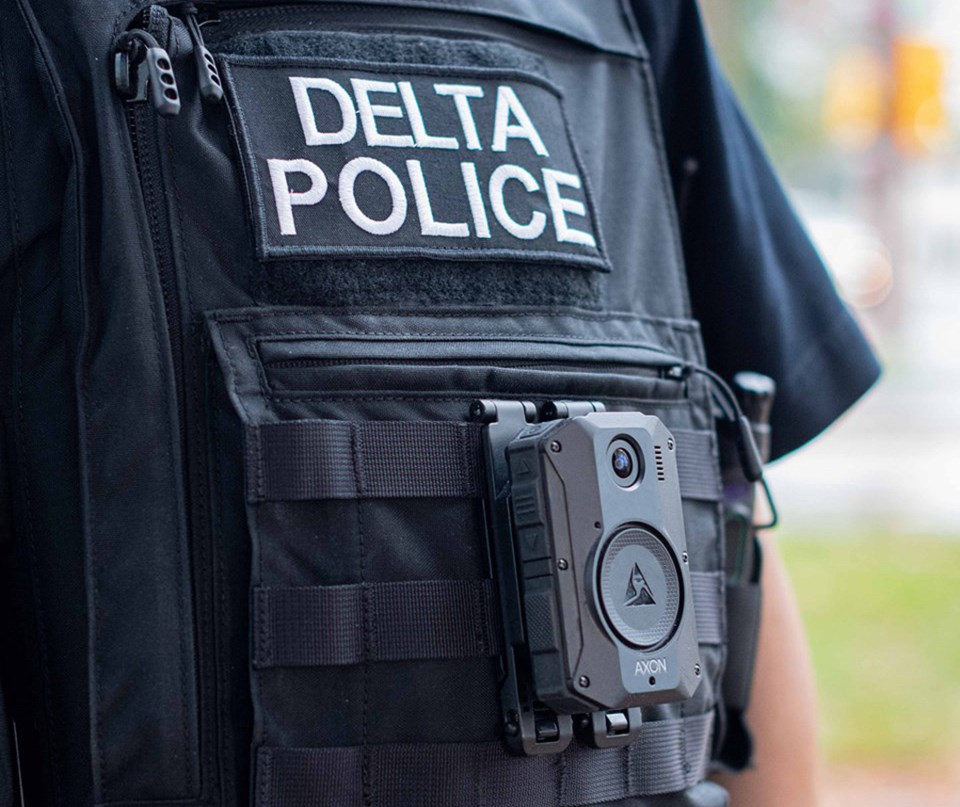The Delta Police Department (DPD) is expanding its use of body worn cameras (BWC).
In May, the department became the first in B.C to deploy the cameras operationally, starting with the Interdiction Team and later expanding to the Traffic Section.
At its Dec. 14 meeting, the Delta Police Board approved a pilot for the DPD's frontline Patrol Services Section (Patrol) to deploy the cameras.
A DPD news release this week notes that the pilot is expected to begin in February for six months.
The cost for the Patrol pilot project, primarily related to the purchase of four additional BWCs and equipment (chargers), will be approximately $6,400.
The department notes that the project will be used following existing policy and provincial standards, with oversight from the Delta Police Management Team.
Under the policy, people are made aware that their interaction with police is being recorded.
The policy also thoroughly outlines the circumstances under which DPD officers may use the cameras, while indiscriminate and continuous recording is not permitted, the department explains.
The DPD notes that the benefits include enhance evidence documentation.
Among other things, the cameras, according to the department, can also provide enhanced transparency, public trust and confidence in policing, as well as enhanced officer safety by discouraging use of force against police and de-escalating high-conflict situations.
Community consultation was undertaken earlier this year. According to the DPD, the consultation found that 93.3 per cent of the community supports expanding the BWC program to the frontline, while 6.7 per cent oppose expansion.
Tsawwassen First Nation Chief Laura Cassidy and the First Nation’s Executive Council added their support for the expansion.
“Police legitimacy and public trust are emerging themes in the current policing landscape and must be at the forefront of a modern and progressive community policing approach, to which the DPD remains committed to,” said Chief Neil Dubord in the news release. “The continued expansion of the BWC program is the fruition of that commitment, in alignment with our community's expectations to whom we are ultimately responsible and provide services to. I am fortunate to have a front-row seat in witnessing our team's commitment, and dedication for our community's safety and well-being and this pilot will support the work of our team.”
Mayor George Harvie, who chairs the police board, said their decision focuses on fostering community trust in police while allowing officers to do their job safely, and the decision further supports the DPD's Community Safety and Well-Being Plan.
Footage will be stored in a centralized Digital Evidence Management System (DEMS), which is mandatory for all municipal police departments.
The DPD says it has also established a strict policy around accessibility and release of BWC footage, meaning footage is only accessible to an investigating officer, their supervisor and others with an investigative or documented need to see the footage.
As far as what the final price tag may be for the department, the DPD admits there may be additional costs related to processing requests that may come from the public, court-related disclosures and other agencies, which can currently be managed with existing staffing and resources.
However, should there be a need to hire for a related position, the expected annual cost will be $84,738, but the DPD says it will make every effort to find internal efficiencies for such a position.



